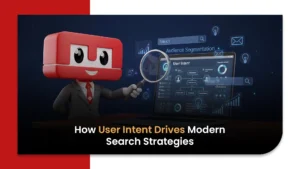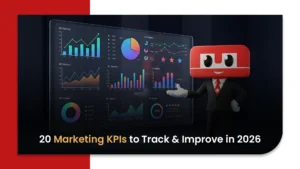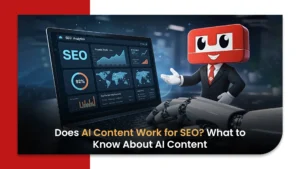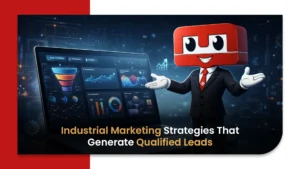
AI in Marketing: A Strategic Partnership for Success
A New Era of Customer Engagement Just Begins
Have you noticed the huge shift in the field of digital marketing? It is all because of the emergence of AI. Picture yourself as a customer service representative at a large online retailer.
You got a call from a customer who is angry because of their recent purchase.
How might AI assist you in resolving their issue quickly and effectively?
AI-powered tools analyze vast amounts of customer data to find patterns and predict potential problems. In this case, AI might recommend a personalized solution based on the customer’s purchase history and common issues.
Now, let’s explore how AI can go beyond customer service and revolutionize the entire marketing landscape.
AI in Marketing: What Difference Does it Make?
What are the advantages that AI brings to the table, especially in digital marketing? The benefits of AI are not boundless.
AI penetrated as a revolutionizer in the digital marketing landscape. Now businesses can streamline operations and deliver highly targeted campaigns with ease. Here are a few benefits of AI that changed the landscape of digital marketing.
Advantages of AI in Marketing
Improved Efficiency
AI technology promises unmatched efficiency for marketers. Let’s take an example:
AI tools can sift through vast datasets. As a result of this, AI provides actionable insights in seconds—something that would take human analysts weeks to achieve. This improved efficiency enhances decision-making and allows for more agile marketing responses.
Enhanced Personalization
AI took personalization to unpredicted heights. AI can offer highly tailored customer experiences. Through the analysis of massive consumer datasets, AI algorithms can foresee user preferences, behavior, and purchasing patterns. This potential paves the way for businesses to deliver personalized marketing messages and product recommendations.
This ultimately results in increased customer engagement, higher conversion rates, and improved customer loyalty.
Predictive Insights
The days of marketers having to base judgments on imprecise data are long gone. Because AI can forecast the future, marketers can now support every decision they make with previous data.
Not only that, businesses can foresee future trends and customer behaviors by using machine learning algorithms. This foresight allows them to optimize their marketing strategy by predicting the results of various initiatives. Predictive Insights also assists resource allocation and enables businesses to focus on high-value initiatives.
As a result of this, businesses will relish increased return on investment. For example, predictive models can lend a hand to brands in deciding the best time to send promotional emails. This task might seem simple but speaks volumes in the end. As a result of this, brands can increase open rates and conversions.
Data-Driven Insights
Fine-tuning the marketing approach is never been this easy, thanks to AI. AI provides marketers with valuable insights based on real-time data analytics. By analyzing client
interactions, behavior, and market trends, AI may help businesses fine-tune their marketing approach, find untapped opportunities, and detect patterns that might otherwise go undetected. This data-driven method leads to more precise targeting and sound decision-making.
AI in Marketing: Challenges to Consider
Data Privacy and Security
Data is the fuel for AI to excel. Without Data AI can’t perform to its full potential.
AI mostly relies on massive datasets. This raises serious concerns about data privacy and security. In today’s privacy-conscious world, organizations must follow strict data protection requirements, such as the General Data Protection Regulation in Europe. The collection and processing of customer data increases the concerns.
The issues are permission, data breaches, and ethical use. Mishandling client data can lead to severe reputational damage and financial penalties. As a result of this, firms are put in a situation to develop strong data protection measures.
Technical Complexity
Do you think you can integrate AI into a digital marketing plan with ease? If yes, then you are wrong. AI technologies need specific field knowledge and infrastructure, such as integrating machine learning algorithms, managing data pipelines, and assuring system compatibility.
This technical complexity is a huge challenge to overcome. This is particularly true for small to medium-sized businesses as they may not have access to skilled data scientists or engineers. Apart from that, there’s an ongoing need for system maintenance and optimization. This adds to the cost and complexity of small and medium-sized businesses.
High Initial Investment
There is no room for doubt about the cost-saving functions and the ability to increase the ROI of a firm using AI. But the catch behind long-term cost savings is the capital investment.
Developing and deploying AI systems frequently necessitates colossal financial resources for obtaining new technologies, hiring AI experts, and training current employees.
For startups or firms with limited resources, the significant initial investment can be too expensive. Therefore, in order to make sure that AI investments are sustainable, it is essential to weigh the possible advantages against the costs and create a long-term plan.
Danger of Relying Too Much on Automation Marketing professionals run the risk of being unduly dependent on machines to make decisions when they use AI automation.
While automation is extremely efficient, there is always the potential of overlooking human nuances or innovative ideas that would appeal more to consumers.
In the end, striking the right balance between AI-driven processes and human intuition is crucial to maintaining innovation and brand authenticity.
The Ending Note
As Provider of Digital Marketing Services in India we believe Without denial, AI enhanced customization, efficiency, data-driven strategies, and many more are possible without any hard work. But like with any cutting-edge technology, there are hurdles to overcome, like worries about data privacy. The intricacy of the technology, and the need for large upfront costs.
Despite these obstacles, businesses that successfully implement AI solutions will gain a great deal, opening up new possibilities for marketing success and customer engagement. Businesses may future-proof their digital marketing campaigns by embracing AI proactively. They now have a competitive edge in a setting where data is used more and more.
AI is revolutionizing marketing by enabling data-driven decision-making, personalized customer experiences, automation of repetitive tasks, and real-time campaign optimization.
AI enhances marketing efficiency, improves customer targeting, increases ROI, and helps marketers understand consumer behavior through predictive analytics and machine learning.
Absolutely. Many affordable AI-powered tools are available for small businesses to automate social media, personalize emails, and gain insights from customer data without a large budget.
AI can automate tasks such as content creation, customer segmentation, email marketing, chatbot interactions, A/B testing, and performance analytics.
No, AI is not replacing marketers—it’s enhancing their capabilities. AI handles data-heavy and repetitive tasks, allowing marketers to focus on creativity, strategy, and human connection.

What started as a passion for marketing years ago turned into a purposeful journey of helping businesses communicate in a way that truly connects. I’m Heta Dave, the Founder & CEO of Eta Marketing Solution! With a sharp focus on strategy and human-first marketing, I closely work with brands to help them stand out of the crowd and create something that lasts, not just in visibility, but in impact!

How User Intent Drives Modern Search Strategies

20 Marketing KPIs to Track & Improve in 2026


